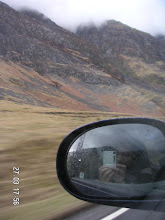 One of Toronto's fastest emerging film festival is Hot Docs, which is also the largest documentary film festival in North America. I was very happy to see this year's program featured a Spotlight on Central and Eastern Europe, considering I had just travelled through there prior to coming to Toronto.
One of Toronto's fastest emerging film festival is Hot Docs, which is also the largest documentary film festival in North America. I was very happy to see this year's program featured a Spotlight on Central and Eastern Europe, considering I had just travelled through there prior to coming to Toronto.The film that really got me thinking about my travels was Never Been Better. The filmaker, a Bosnian, fled the war in 1995 to the Czech Republic. Ten years later she was allowed to apply for a Czech passport, and this started her thinking about her identity so she wanted to revisit the region to answer her personal questions. She took two weeks to drive through Bosnia & Herzegovina, Serbia & Montenegro and Croatia, the three countries involved in the war and interviewed people of the three dominant faiths in this area: Orthodox Christians, Muslims and Catholics.
I found the same tension that she spoke of in the film, but I also felt so much more was missing. The Q&A session afterwards however revealed her intention of keeping the story to just those two weeks, ending on the final day when she received her Czech citizenship. This was a highly personal film and I was glad it made me re-examine what I've learnt about this volatile region and what my experience there meant to me. I hope to visit Central Europe again one day.
In Memoriam Alexander Litvinenko was the film that left the greatest impression on me out of all the films I saw. It is the story of murdered Russian secret service agent Alexander Litvinenko, who died of polonium poisoning in London, November of last year.
In 2004, two years before his death, Litvinenko was already being interviewed by filmmaker Jos de Putter. Litvinenko spoke of his time with the secret service the FSB, formerly the KGB, and how he became a persecuted man when he became disillioned with the organisation's activities. During an incredible episode of this period, Litvinenko was charged and trialled for crimes the FSB alleged he committed.
The courthouse on that final day was crammed with media and film cameras as Litvinenko's denoucement of the Putin government was powerful. He had evidence indicting many supposed terrorist acts by Chechen separatists were in fact FSB orchestrations to push and keep Putin in power; in one campaign in 1999, over 300 innocent civilians were killed. As the judge gave the not guilty verdict, however, the cameras captured a most absurb turn of events. Instead of walking away a free and innocent man, a band of masked FSB men with guns stormed the courtroom, apprehended Litvinenko and locked him away for two months. The media and public watched in shock. The courts had no power.
When Litvinenko was released, he continued with his work on exposing the unlawful acts of the Putin government. He believed journalist Anna Polikovskaya was murdered because she too spoke out against the government. Eventually Litvinenko and his family had to leave Russia for the safety of Britain.
The day he received his British passport was one of the happiest said his father, that he was proud of being an Englishman.
Two months before his death, the Russian government had passed a law that allowed it to pursue its targets at home, and abroad.
Unimaginable, or one would think.

No comments:
Post a Comment